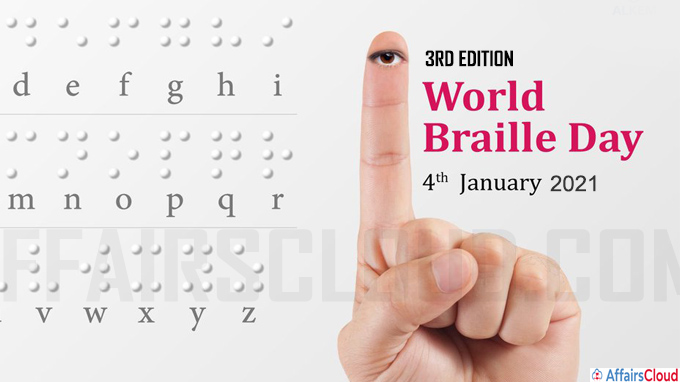
The United Nations(UN) World Braille Day is annually observed on 4th January, to promote and create awareness about the importance of Braille as a means of communication in the complete realization of the human rights of the visually impaired and partially sighted people.
This year (2021) marks the 3rd edition of the World Braille Day.
The day marks the birth anniversary of Louis Braille, the French educator and the inventor of Braille language, a system of reading and writing for the visually impaired.
Aim:
To recognise that the realization of Human rights and fundamental freedoms depends on the inclusive written promotion.
Background:
The United Nations General Assembly (UNGA) adopted the resolution A/RES/73/161 on 17th December 2018 and proclaimed the 4th January of every year as the World Braille Day.
The first Word Braille Day was observed on 4th January 2019.
Braille Language:
i.The Braille language is a tactile representation of the alphabets and numerical symbols using 6 dots.
ii.The combination of the 6 dots are used to represent letter, number, musical, mathematical and scientific symbols.
iii.The braille language is used by blind people and partially sighted people to read the books and periodicals like the printed ones.
iv.The Braille plays a major role in education, freedom of expressions & opinion and social inclusion of the visually impaired people.
COVID-19 and people with disabilities:
According to the UN, the people with disabilities are less likely to access health care, education, employment and participation in community.
The people with disabilities are most likely to live in poverty, and face higher rates of violence, neglect and abuse.
The COVID-19 pandemic had highlighted the importance of the essential accessible formats like braille and audible formats which will help the visually impaired who rely on touch to communicate their needs.
Efforts to support people with disabilities:
i.The United Nations Children’s Fund (UNICEF) has produced multilingual guidance notes –COVID-19: Considerations for Children and Adults with Disabilities– in accessible formats like Braille and “easy to read”.
ii.This addresses issues like access to information; water, sanitation and hygiene; health care; education; child protection; and mental health and psychosocial support, as well as considerations for an inclusive workplace.
Writing Peace:
i.The “Writing Peace”, a manual that encourages young people to discover contemporary writing by introducing various languages including Braille.
ii.The writing peace creates awareness about the independence of culture among children by familiarizing them with contemporary writing systems, their history and their borrowing.
About UNICEF:
Executive Director– Henrietta Holsman Fore
Headquarters– New York, United States of America




